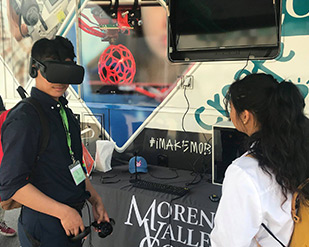High School Counselors
MVC is the local college of choice for graduating high school students
From free application and low tuition costs, to small class sizes and direct pathways to careers and university transfer, Moreno Valley College offers a wealth of options to students in the Inland Empire. MVC allows students to explore, to choose an affordable school that can take them to a UC, CSU or private university, and receive the support they need to be able to study and succeed.
We meet our Mountain Lions where they're at and help them take their next steps.

Getting Students Started at MVC

Academics Programs
- Fields of Interest
- Program Finder
- Associate Degrees for Transfer
- About General Education
- More ways to learn (online courses, Honors, CTE, noncredit, apprenticeships and more)

College Courses for Current High School Students

Student Services

Special Support Programs
- All Special Support Programs
- For culturally-relevant learning: Umoja and Puente
- For underserved students: ACES and EOPS
- For foster students: NextUp and Guardian Scholars
- For more academic challenges: Honors
Articulation Resources
Articulation agreements reduce the need for students to repeat coursework in college and facilitates a smooth transition between educational institutions. It allows students to more efficiently reach their educational and career goals.
- High School Articulation: High school courses taken by high school students during the traditional school day, courses are aligned with a community college course in the same discipline, courses are taught by the high school faculty, on the high school campus, serves high school students only.
- Dual Enrollment: College courses taken by high school students, courses typically offered on the high school campus during the traditional school day, courses are typically taught by high school faculty who meet community college minimum qualifications, these courses serve primarily high school students.
- Concurrent Enrollment: College courses taken by high school students outside of the traditional school day, courses are typically offered on community college campus, courses are taught by community college faculty, and they are open to the public.
All three methods provide high school students the opportunity to get a “jump-start” on their education – saving valuable time and money in the process! In addition, students will gain confidence in their ability to complete college work which should help them to transition into post-secondary education much easier.
The most recent course outlines for review for RCCD courses can be accessed through CurriQunet Public Search.
- Visit CurriQunet Public Search
- Click on the Course button
- Select the subject from the drop-down menu (listed as a three letter abbreviation) and then choose search. This will open up a list of all subject-related courses.
- Once you locate the course you want, click on the paper icon to open up a submenu. Choose "Course Outline" from the submenu to view the corresponding outline.
Career & Technical Education
High School Articulation is a process in which High School CTE courses are deemed equivalent to College CTE courses through a formal agreement. College credit will be awarded to students that successfully pass the course according to the terms of the agreement. The credit actually appears on a student’s college transcript with the same letter grade they received in their high school class. For example, if a student receives a grade of “A” in their high school articulated course, their college transcript will show the grade of “A” next to the articulated college course. Active articulation agreements must be in place between the student’s high school district and an RCCD college (Moreno Valley College, Norco College, or Riverside City College) at the time the student was enrolled in the high school class.
By taking an articulated course(s) in High School students can benefit from the following:
- Time: 3 units = 54 class hours and more than 100 homework hours. Save 150 hours
- Time: 60 units needed to transfer to Four-Year college–3 units in high school taken = 57 units left
- Money: For a 3 unit class, students pay $46 per unit and over $100 for a textbook. Save $250
- Goals: Classes can be used towards CTE Certificate, Associate Degree, Transfer to Four-Year College
For more information, contact CTE Projects at cte-info@rccd.edu.
The Career And Technical Education Management Application (CATEMA) system is a web-based
system for managing information relating to advanced educational courses, schools,
students, teachers,
counselors, administrators and staff. Teachers will need to set up an account so that
students can link and register for the articulated class(es) they are taking. Teachers
will use CATEMA to make credit recommendations for their students.
- To communicate with students and their parents about earning college credit via their articulated class early in the school year.
- Add all articulated class sections into CATEMA at the beginning of each semester/school year.
- Ensure students have completed the college application, set-up their CATEMA account, and register for their class(es) in CATEMA.
- Accept/not accept each student enrollment in their class(es) in CATEMA.
- Assign grades and recommend credit/no credit in CATEMA at the end of semester/year for each student on their CATEMA roster(s).
- Renew articulation agreements as they expire.
- Inform college should course content change
- Work collaboratively with secondary teachers and other college personnel to review requests to articulate coursework.
- Approve articulation agreements.
- Promote ongoing dialogue with secondary sites to ensure that the curriculum standards set by the college are maintained and promote student progress.
Teachers interested in articulating their high school course should look at the Moreno Valley course catalog for course descriptions to find the course that would best match their high school course. Review your district's course outline and compare it to the college’s course outline, which can be found on RCCD Course Outlines for Review. Fill out the proposal form and email it along with course outline and sample tests to cte-info@rccd.edu.
